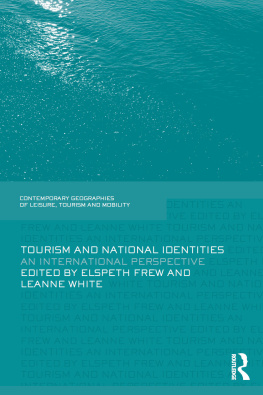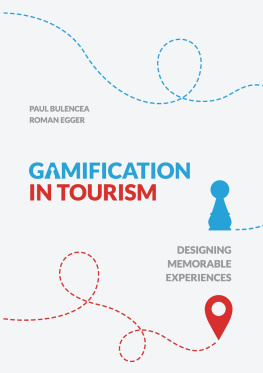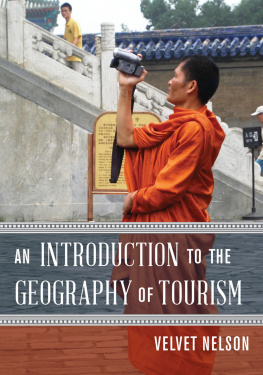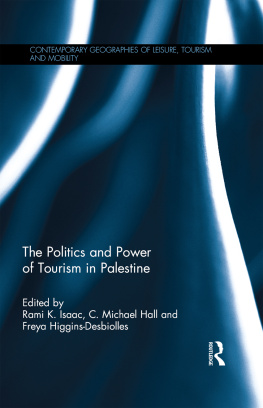New Directions in Anthropology
General Editor: Jacqueline Waldren, Research Associate at the Institute of Social and Cultural Anthropology and International Gender Studies, Oxford University and Director, Deia Archaeological Museum and research Centre, Mallorca.
Twentieth-century migration, modernization, technology, tourism, and global communication have had dynamic effects on group identities, social values and conceptions of space, place, and politics. This series features new and innovative ethnographic studies concerned with these processes of change.
For a full volume listing of the series, see pages .
First published in 2010 by
Berghahn Books
www.berghahnbooks.com
2010, 2013 Noel B. Salazar
First paperback edition published in 2013
All rights reserved. Except for the quotation of short passages for the purposes of criticism and review, no part of this book may be reproduced in any form or by any means, electronic or mechanical, including photocopying, recording, or any information storage and retrieval system now known or to be invented, without written permission of the publisher.
Library of Congress Cataloging-in-Publication Data
Salazar, Noel B., 1973-
Envisioning eden : mobilizing imaginaries in tourism and beyond / Noel B. Salazar.
p. cm. (New directions in anthropology ; v. 31)
Includes bibliographical references and index.
ISBN 978-1-84545-760-0 (hbk.)--ISBN 978-0-85745-903-9 (pbk.)
1. Culture and tourismCase studies. 2. TourismIndonesiaYogyakarta 3. TourismTanzaniaArusha. I. Title.
G156.5.H47S35 2010
338.4791--dc22
2010023976
British Library Cataloguing in Publication Data
A catalogue record for this book is available from the British Library
Printed in the United States on acid-free paper.
ISBN: 978-0-85745-903-9 Paperback ISBN: 978-0-85745-924-4 Retail Ebook
FOREWORD
CIRCULATING CULTURE
My first ethnological research in Indonesia was conducted among the Toba Batak, an ethnic group located in the highlands of North Sumatra. I lived in a village community and subsequently extended my work among the Batak to those who had migrated to the coastal city of Medan, to Jakarta and Bandung on the island of Java, and even to Batak settlements in Denpasar, Bali. My objective was to study how Batak culture and identity had changed in different localities and settings.
In the 1980s, I shifted my research focus to the study of tourism in Bali and elsewhere, but I retained my interest in Indonesian and especially Toba Batak identity and cultural change. On one trip to Bali, I stopped off in Jakarta to visit with two of my former students, Koentjaraningrat and Parsudi Suparlan, both of whom were now professors in the anthropology department of the University of Indonesia. I met with anthropology majors and graduate students on social occasions and took the opportunity to interview them informally about issues of identity and particularly about their own experiences living among so many different ethnic groups in Jakarta, the capital and foremost urban centre of Indonesia. My thought was that these young, sophisticated intellectuals would not only have fresh insights but would represent one of the most modern segments of Indonesian society.
They were forthcoming in telling me personal stories of their experiences, and I avidly took field notes, but soon their responses seemed, somehow, hauntingly familiar. I finally realized that they were repeating to me my own analysis of Indonesian identity that I had previously published in venues such as the American Anthropologist and in a monograph of the British Association of Social Anthropologists. I learned that my work had been assigned reading in university anthropology classes taught by my former Indonesian students, now professors. There were, of course, individual variations and some adhered to my views more closely than others did, but the basic pattern of my analysis of ethnicity was evident.
Well, I thought, possibly they are just being polite and reserved, following deeply rooted Javanese practice, and are consciously telling me what they thought I wanted to hear. Further inquiry, however, revealed that my writings had become internalized and that they often used Indonesian translations of my own language. My publications had helped to shape their understandings of their own experiences of ethnicity. I felt that they were not dissembling but that they truly believed what they were telling me. After all, how one experiences ethnicity in an urban settingwith others from many different ethnic backgrounds who speak not only standard Indonesian but also mutually unintelligible ethnic languages and have varied ethnic customsis often inchoate, or not consciously articulated, so that an interpretation in writing, taught by their instructors at the university, based on the research of a high-status foreign scholar takes on a degree of credibility and authority that is hard to resist. There are in Indonesia over three hundred different ethnolinguistic groups, spread over a three-thousand-mile-long archipelago, and how one practices ethnicity has to be balanced against the official government position stressing a single Indonesian identity. The national government's principle is unity in diversity, but how ethnicity is handled in Indonesia is complex, politically loaded, often felt as a struggle and is frequently contested. Possibly the students welcomed an authoritative perspective that served to settle what had been problematic.
What a predicament! I thought I was gathering new ethnological field data but actually the students were repeating myself to me. My writings were used to interpret their experiences, which were then fed back to me as fresh ethnographic information. That early encounter in Jakarta, however, was not the only time this has happened.
Noel Salazar, in his stunning book Envisioning Eden, writes that Pak Hardi, the Yogyakarta chairperson of HPI (Indonesian Tourist Guide Association), has a Bachelor's degree in anthropology from Gadjah Mada University. When I was in Tanzania, I received a message from him, proudly telling me he is now using Bruner's Culture on Tour: Ethnographies of Travel (2005) in his classes. Thus, the chair of the Yogyakarta tour guide association is using my book to teach prospective tour guides about tourism. If in the future I were to study tour guides in Central Java, it is entirely possible that they would present the substance of my own writings back to me, or at least they might interpret their experiences of tourism in light of my work. So where is the dividing line between raw data in the field and our own scholarly anthropological research reports? In the past, we anthropologists made a firm distinction between those in the field, the natives, the source of the data and our ethnographic analysis and theorizing, but for at least three decades this distinction has been called into question and is increasingly losing its standing in our globalizing world. Culture is circulating, and the subject and the object are merging.










